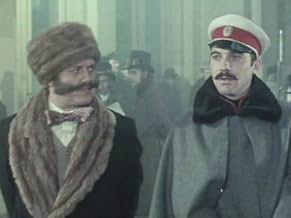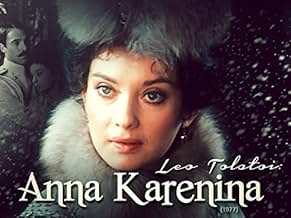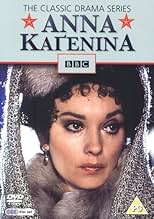Aggiungi una trama nella tua linguaAnna Karenina is the young wife of an older husband. She has an affair with the handsome Count Vronsky. By following her desires, Anna complicates her life.Anna Karenina is the young wife of an older husband. She has an affair with the handsome Count Vronsky. By following her desires, Anna complicates her life.Anna Karenina is the young wife of an older husband. She has an affair with the handsome Count Vronsky. By following her desires, Anna complicates her life.
- Candidato a 2 Primetime Emmy
- 5 candidature totali
Sfoglia gli episodi
Recensioni in evidenza
After recently reading and falling in love with the book, I started doing research into the filmed adaptations of the novel. I first watched the BBC adaptation from 2000, which impressed me, but I was somewhat disappointed by the amount of editing done to the story.
I, therefore, picked up this version with great anticipation, because it is much longer (10 hours) and I was hoping would therefore be a more fully realized version of the story.
Unfortunately, I barely made it through the first hour before turning it off and giving up on it.
The whole production felt too staged and unnatural for my taste. The actors looked like English 'thespians' dressed up in stock period costumes rather than Russian aristocrats. And they all more or less spoke in the same loud and clear stage voice making the conversations feel less intimate than I would have liked.
Camera-work and directing was mostly just like that of a noontime soap opera.
I'm sure that in 1977 this was perfectly acceptable, but nowadays, it is just not good enough to spend time watching. It certainly does no justice to what is often considered one of the greatest novels ever written.
If you are looking for a filmed adaptation of this story, stick with the more recent version from 2000. While it is a somewhat edited down version of the story, it is a much superior product that does a far better job of fully capturing the richness of Tolstoy's novel.
I, therefore, picked up this version with great anticipation, because it is much longer (10 hours) and I was hoping would therefore be a more fully realized version of the story.
Unfortunately, I barely made it through the first hour before turning it off and giving up on it.
The whole production felt too staged and unnatural for my taste. The actors looked like English 'thespians' dressed up in stock period costumes rather than Russian aristocrats. And they all more or less spoke in the same loud and clear stage voice making the conversations feel less intimate than I would have liked.
Camera-work and directing was mostly just like that of a noontime soap opera.
I'm sure that in 1977 this was perfectly acceptable, but nowadays, it is just not good enough to spend time watching. It certainly does no justice to what is often considered one of the greatest novels ever written.
If you are looking for a filmed adaptation of this story, stick with the more recent version from 2000. While it is a somewhat edited down version of the story, it is a much superior product that does a far better job of fully capturing the richness of Tolstoy's novel.
This version of 'Anna Karenina' by Tolstoy presents the story in ten parts of around 50 minutes each. Starring Nicola Pagett, best known as Elizabeth Bellamy in 'Upstairs, Downstairs', as Anna; with Stuart Wilson as Vronsky and Eric Porter as Karenin.
This is a leisurely version, with time to develop the minor characters and subplots, while keeping true to the book in the story of Anna's affair with Count Vronsky, and its tragic conclusion. It starts with the infidelity of her brother and in doing so, shows the difference between men and women where divorce and adultery are concerned.
As Anna, Pagett is excellent, veering from thoughtless frivolity to total despair; while Eric Porter is perfect as Karenin, strong, tormented, and complicated. Stuart Wilson is charming as Vronsky, looks the part and is an appealing character. In support the rest of the cast are excellent too, especially Sheila Gish as Betsy and Mary Morris as Countess Vronsky.
This mini series is well worth your time and doesn't have a dated feel at all - the space given to the story means this version has more weight than those with Garbo or Vivien Leigh.
This is a leisurely version, with time to develop the minor characters and subplots, while keeping true to the book in the story of Anna's affair with Count Vronsky, and its tragic conclusion. It starts with the infidelity of her brother and in doing so, shows the difference between men and women where divorce and adultery are concerned.
As Anna, Pagett is excellent, veering from thoughtless frivolity to total despair; while Eric Porter is perfect as Karenin, strong, tormented, and complicated. Stuart Wilson is charming as Vronsky, looks the part and is an appealing character. In support the rest of the cast are excellent too, especially Sheila Gish as Betsy and Mary Morris as Countess Vronsky.
This mini series is well worth your time and doesn't have a dated feel at all - the space given to the story means this version has more weight than those with Garbo or Vivien Leigh.
Both of the leads, Nicola Paget and Stuart
Wilson, are nearly perfect in their roles. Wilson especially is a fully developed character and one a woman might fling away her life for. Nicola Paget is beautiful, high strung, and portrays Anna as a woman on the edge...more or less forced into an early marriage with a stuffy, pompous and very dull statesman. Only the love for her young son prevents her from divorcing at any cost. Meanwhile the love of her life Vronsky suffers for her as she drives herself to distraction. Wilson is really excellent as Vronsky and I also loved him as Fernando Lopez in The Pallisers. He is an underrated dramatic actor. The supporting characters are mostly well-cast and well-acted. I have watched many versions of this story and this version ranks at the top for me.
10emtj-1
I just saw the mini-series and enjoyed it so much. Yes, it was filmed in the 70s so perhaps it might be dated in its production values, but in its performances and dialogue and sheer emotional highs and lows, it is far superior to any of the other Anna Kareninas I have seen. Nicola Paget was simply smashing - you might remember her as the actress who brought Elizabeth Bellamy so vividly to life in Upstairs, Downstairs. She will simply break your heart with her portrayal of Anna. And Count Vronsky is played by the dashing Stuart Wilson, who looks every bit the part of a man a woman would give up so much for. I fell in love with this actor when he played Fernando Lopez in The Pallisers, another marvelous 70s miniseries. The trio of superb performances includes Eric Porter as Anna's rigid and emotionally devastated husband, who is hiss-worthy in many scenes, yet manages to convey the emotions boiling inside of him, giving one pause to totally hate him. Eric Porter was the marvelous Soames Forsyte in the 1967 series The Forsyte Saga, simply one of the best mini-series ever presented on television. I gave this ten stars, because when I am watching a novel by Tolstoy adapted for television, I want to see the emotions of the novel brought to life, more than I care about the settings. The entire cast is excellent, with nary a badly cast role. I had rented the series, but now have ordered it so that I can watch it again, in its entirety, whenever I please.
While the best film versions are the 1967 Russian and 1935 Greta Garbo films, the best overall adaptation seen so far of Tolstoy's masterpiece Anna Karenina goes to this mini-series, the only adaptation personally seen so far that doesn't have any major debits.
Visually, it is a real beauty, with some breath taking scenery and sets, opulent costume design and elegant photography with lots of handsome colour. The period detail is not quite as evocative as it is in the 1967 and 1997 (with Sophie Marceau) films, but it is still remarkably authentic for a 70s made-for-TV mini-series. The music is appropriate and hauntingly beautiful, wisely keeping itself to the background in crucial scenes to let the dialogue really register, including a rare chance of hearing glimpses of Tchaikovsky's Manfred Symphony used for a mini-series. The mini-series also has a very thought-provoking, beautifully structured and literate script, that feels and sounds like Tolstoy's writing coming to life from the pages of the novel, covering all the major events and more and with the full emotional impact and more.
The story of Anna Karenina is very faithfully adapted here, one of the most faithful treatments of any adaptation of the novel in fact. In terms of detail, the major events, the subplots, the themes and the characters are all here, and not in Cliff Notes form, this is the real deal. The long length, with the 9 hour plus duration and 10 episodes, was more than appropriate and allowed richer characterisation, more of the story (this adaptation has the most well developed Levin by far for example) and all the material to be fully expanded upon (things that a 2-4 hour film couldn't do as effectively), as was the steady and very measured pacing to allow one to get fully immersed in the atmosphere and let the many nuances of the story and text come through. Anna Karenina (1977) is beautifully directed throughout, and the characters and their situations are always interesting.
Nicola Pagett is outstanding as a particularly passionately vulnerable Anna, which is played with pitch-perfect heartfelt pathos, and Stuart Wilson blows all the Vronskys in the film adaptations out of the water in a portrayal that is much more complex than any of the portrayals in any of the film versions, where half of the cinematic Vronskys make for problematic casting. The chemistry between the two of them is very believable with no sudden transitions and it doesn't feel rushed. Eric Porter's Karenin, a role played to a consistently high level in all the adaptations even in the weaker ones, is more conflicted than most, rather than being too sympathetic or too much of a reptile, more of a man caught in situations that more expose his weaknesses than his strengths, and he plays it magnificently. Robert Swann stands out in support as an ambivalent and multi-layered Levin, in a cast where everybody comes off strongly with few if any weak links.
All in all, a superb adaptation, adapted Tolstoy rarely gets much better than this. 10/10 Bethany Cox
Visually, it is a real beauty, with some breath taking scenery and sets, opulent costume design and elegant photography with lots of handsome colour. The period detail is not quite as evocative as it is in the 1967 and 1997 (with Sophie Marceau) films, but it is still remarkably authentic for a 70s made-for-TV mini-series. The music is appropriate and hauntingly beautiful, wisely keeping itself to the background in crucial scenes to let the dialogue really register, including a rare chance of hearing glimpses of Tchaikovsky's Manfred Symphony used for a mini-series. The mini-series also has a very thought-provoking, beautifully structured and literate script, that feels and sounds like Tolstoy's writing coming to life from the pages of the novel, covering all the major events and more and with the full emotional impact and more.
The story of Anna Karenina is very faithfully adapted here, one of the most faithful treatments of any adaptation of the novel in fact. In terms of detail, the major events, the subplots, the themes and the characters are all here, and not in Cliff Notes form, this is the real deal. The long length, with the 9 hour plus duration and 10 episodes, was more than appropriate and allowed richer characterisation, more of the story (this adaptation has the most well developed Levin by far for example) and all the material to be fully expanded upon (things that a 2-4 hour film couldn't do as effectively), as was the steady and very measured pacing to allow one to get fully immersed in the atmosphere and let the many nuances of the story and text come through. Anna Karenina (1977) is beautifully directed throughout, and the characters and their situations are always interesting.
Nicola Pagett is outstanding as a particularly passionately vulnerable Anna, which is played with pitch-perfect heartfelt pathos, and Stuart Wilson blows all the Vronskys in the film adaptations out of the water in a portrayal that is much more complex than any of the portrayals in any of the film versions, where half of the cinematic Vronskys make for problematic casting. The chemistry between the two of them is very believable with no sudden transitions and it doesn't feel rushed. Eric Porter's Karenin, a role played to a consistently high level in all the adaptations even in the weaker ones, is more conflicted than most, rather than being too sympathetic or too much of a reptile, more of a man caught in situations that more expose his weaknesses than his strengths, and he plays it magnificently. Robert Swann stands out in support as an ambivalent and multi-layered Levin, in a cast where everybody comes off strongly with few if any weak links.
All in all, a superb adaptation, adapted Tolstoy rarely gets much better than this. 10/10 Bethany Cox
Lo sapevi?
- QuizAnna Karenina is a novel by the Russian author Lev Tolstoy, first published in book form in 1878. Considered to be one of the greatest works of literature ever written, Tolstoy himself called it his first true novel. It was initially released in serial installments from 1875 to 1877, all but the last part appearing in the periodical The Russian Messenger. When William Faulkner was asked to list what he thought were the three greatest novels, he replied: "Anna Karenina, Anna Karenina, and Anna Karenina."
- ConnessioniFeatured in The 30th Annual Primetime Emmy Awards (1978)
I più visti
Accedi per valutare e creare un elenco di titoli salvati per ottenere consigli personalizzati
- How many seasons does Anna Karenina have?Powered by Alexa
Dettagli
Contribuisci a questa pagina
Suggerisci una modifica o aggiungi i contenuti mancanti































